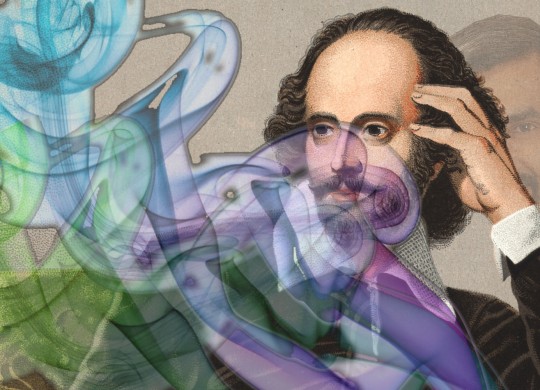Inspired!

They think he was high. Stoned. William Shakespeare (1564?–1616).
That’s what they claim in “Shakespeare, Plants, and Chemical Analysis of Early 17th-century Clay ‘Tobacco’ Pipes from Europe,” published recently in the South African Journal of Science, by Francis Thackeray and his cohorts (including a police inspector from a narcotics lab).
Sir Francis Drake and Sir Walter Raleigh introduced tobacco into Elizabethan England in the days of Shakespeare. However, there were several kinds of “tobacco.”
Chemical analyses of early 17th century “tobacco” pipes from Stratford-upon-Avon and its environs using sophisticated gas chromatography mass spectrometry on pipe bowls and stems, on loan from the Shakespeare Birthplace Trust in Stratford-upon-Avon—some actually excavated from the garden of the Bard—indicated not only nicotine, but also cannabis and Peruvian cocaine!
One remembers that Shakespearian sonnet …
Why is my verse so barren of new pride?
So far from variation or quick change?
Why with the time do I not glance aside
To new-found methods and to compounds strange?
Why write I still all one, ever the same,
And keep invention in a noted weed,
That every word doth almost tell my name,
Showing their birth and where they did proceed?
O, know, sweet love, I always write of you,
And you and love are still my argument;
So all my best is dressing old words new,
Spending again what is already spent:
For as the sun is daily new and old,
So is my love still telling what is told.
WS, Sonnet 76
One has to wonder what “compounds strange” means. And “invention [inspiration in writing] in a noted weed.” That’s how he was inspired? Hmmm ….
Of course, there is no proof that ye olde WS smoked pot, but one does wonder. And if he did, he’d join a long line of litterateurs who have sought inspiration in chemicals for their verbal output, from Byron, Keats, Shelley, and onwards.
The Bible, too, is inspired, but not by chemicals, but by a Spirit.
All Scripture is God-inspired and profitable for teaching, for reproof,
for correction, for training in righteousness;
that the man of God may be complete, equipped for every good work.
2 Timothy 3:16–17
And …
… men moved by the Holy Spirit spoke from God.
2 Peter 1:21
This attests to the nature of the Bible as divine discourse—its human authors guided by the divine Author, the Holy Spirit, to produce the word of God. The first-century church father, Clement of Rome, called Scripture “the true utterances of the Holy Spirit” and “the oracles of God” (1 Clement 45, 53). The third-century theologian Origen also held “the holy Scriptures to be no human compositions, but to be written by inspiration of the Holy Spirit” (First Principles 4.9). Augustine of Hippo expounded on this divine agency working through human authors:
All that he [God] intended to give for our perusal
on the matter of his own doings and sayings,
he commanded to be written by those disciples,
whom he thus used as if they were his own hands.
Augustine, Harmony of the Gospels 1.35.54
And, well beyond the age of the church fathers, the church held this to be dogma: Scripture was divinely inspired discourse. The Dominican theologian, Thomas Aquinas (1225–1274), declared that “[t]he author of Holy Scripture is God” (Summa Theologica 1.1.10). During the Reformation era, Luther was explicit: “Thus you are to deal with Scripture that you consider it as God himself speaking.”
That it is divinely inspired discourse renders the Bible binding—it is normative and presecriptive for the faith and practice of all Christians.
Truly inspired!











 Abe Kuruvilla is the Carl E. Bates Professor of Christian Preaching at The Southern Baptist Theological Seminary (Louisville, KY), and a dermatologist in private practice. His passion is to explore, explain, and exemplify preaching.
Abe Kuruvilla is the Carl E. Bates Professor of Christian Preaching at The Southern Baptist Theological Seminary (Louisville, KY), and a dermatologist in private practice. His passion is to explore, explain, and exemplify preaching.